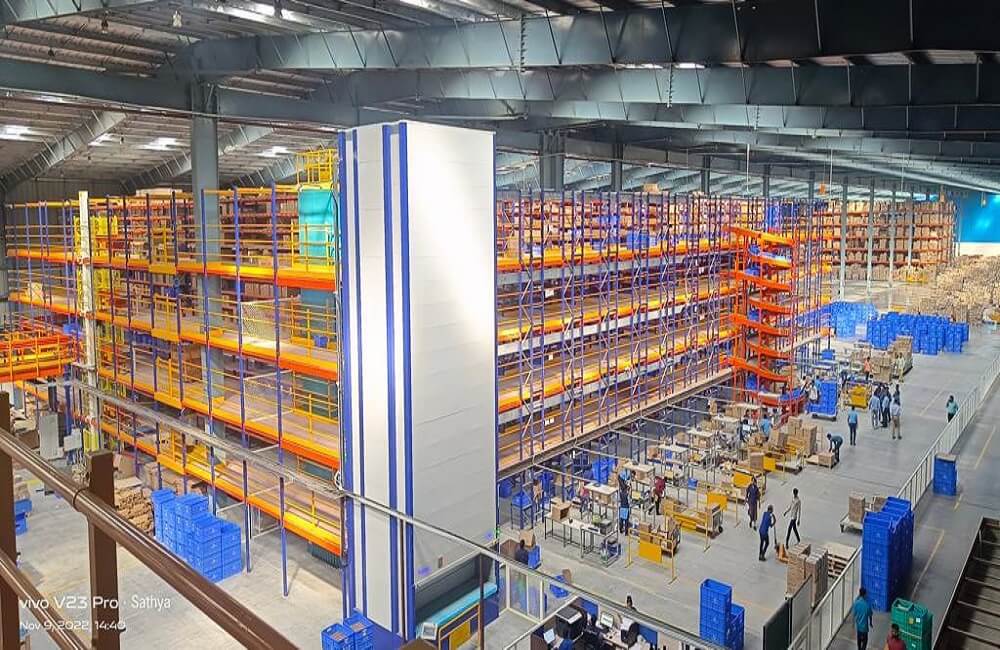Amit Maheshwari, Founder & CEO, Softlink Global Pvt Ltd., speaks on the emerging trends in the logistics & supply chain industry
In this interview, we delve into the dynamic world of logistics and supply chain management with Amit Maheshwari, Founder & CEO, Softlink Global Pvt Ltd. Explore the evolving landscape, the role of technology, and the challenges and opportunities shaping the future of this vital sector.
Could you provide a current overview of the state of the Logistics and Supply Chain industry?
The logistics and supply chain industry is at a fascinating crossroads right now. On one hand, you have declining freight rates and volumes that are putting a pinch on everyone’s margins. That’s the reality we can’t ignore. But on the flip side, this situation presents a golden opportunity to streamline and modernize.
You see, the issues we’re facing aren’t just about moving goods from Point A to Point B anymore. It’s about how you do it efficiently, transparently, and sustainably. And that’s where technology becomes the game-changer. I always like to say, “In the world of logistics, technology isn’t just an enabler; it’s a disruptor.”
By leveraging technology, logistics businesses can significantly reduce operational costs and enhance efficiency. For example, freight forwarders can adopt sophisticated logistics software to optimize routes, improve cargo tracking, and automate workflows. This helps maintain margins even in a challenging environment.
At Softlink Global, we’re committed to helping the industry turn these technological advances into competitive advantages. We’re constantly innovating and developing new solutions to empower logistics businesses to operate more efficiently and effectively. While the current landscape is certainly challenging, I believe that with the right technology, businesses can not only survive but thrive in this environment. It’s all about adapting to the changes and leveraging technology to your advantage.
According to you, what are the trends that will reshape the logistics and supply chain in 2024?
The trends for 2024 are incredibly exciting. The logistics industry is rapidly transforming into an AI-centric space. Automated documentation through AI is something we’re particularly excited about at Softlink Global. Minimizing errors in documentation means quicker clearances and faster shipments, which are critical to keeping a competitive edge. Advanced route planning, enabled by AI, is another transformative trend. It’s not just about finding the quickest route anymore; it’s about optimizing for external factors like weather, traffic, fuel costs or even geopolitical situations to make deliveries faster and more cost-effective.
And let’s not forget about drone deliveries! The potential there is just mind-boggling. They’re already being piloted in places like China for food and parcel deliveries and even in India for emergency medicine deliveries. Drones are about to redefine what we mean by last-mile connectivity, making it quicker and more efficient.
In short, as technology continues to evolve, businesses in the logistics and supply chain industry need to adapt. Staying competitive means staying ahead of the game in terms of adopting these new technologies. At Softlink Global, we’re committed to staying at the forefront of these trends, helping our clients navigate this fast-changing landscape. It’s a thrilling time to be in the industry, and I can’t wait to see how these trends shape our future.
What role do you think government policies and initiatives can play in addressing the shortage of technically skilled personnel and promoting lifelong learning?
Great question. Government policies and initiatives play a critical role in addressing the skills gap and promoting lifelong learning. While the Indian government is doing a commendable job by investing in vocational pieces of training, there’s still room for improvement, especially when it comes to hands-on, practical exposure. That’s really where the rubber meets the road.
That’s why we started the Logi-Sys Certification Program. As industry leaders in enterprise software for logistics, we felt a responsibility to step in and help enhance the technical competency in the sector. After a triumphant collaboration with Mumbai University and Garware Institute, we’re gearing up to offer this certification more broadly, emphasizing hands-on experience and industry readiness. Going forward, we have plans to make the program available online, to ensure it reaches a wider audience of logistics professionals looking to upskill.
Government policies and initiatives provide the foundation, but it’s up to us in the industry to build on that foundation and ensure that our workforce is equipped with the skills and knowledge they need to thrive in the fast-evolving logistics landscape.
In your opinion, what are the main challenges that logistics companies face in maintaining financial stability? Can you discuss the role of technology in improving financial stability within the logistics industry?
Absolutely, financial stability is one of the key challenges that logistics companies face. Our industry is inherently seasonal, meaning irregular cash flows are almost a given. To make matters more complicated, traditional credit norms for shippers, delays in billing, and even incorrect invoicing can put a strain on liquidity. And let’s face it, in a low-margin business like logistics, cash is king.
This is where technology can make a significant difference. Take our Logi-Sys platform, for example. It has a financial management module specifically designed to address these issues. The module ensures timely and accurate invoicing, monitors cash flows, and automates key financial processes. In essence, it acts like your financial control tower, giving you a panoramic view of your financial health, so you can make data-driven decisions.
The role of technology in improving financial stability can’t be overstated. As businesses grow more complex, the old manual ways of managing finances just won’t cut it. Automation and real-time insights are crucial for navigating the financial complexities of the logistics industry.
So yes, while challenges to financial stability in logistics aren’t going away anytime soon, the technology is here to help firms stay ahead of the curve and maintain, if not bolster, their financial stability. At Softlink Global, we’re committed to creating tools that help logistics firms manage these challenges more effectively.
What considerations should organizations keep in mind when integrating AI into their management systems? Are there any potential risks or ethical implications that they should be aware of?
Great question, and it’s something that’s often overlooked when companies jump on the AI bandwagon. First off, it’s essential to understand that AI isn’t a replacement for human decision-making—it’s a tool that augments our capabilities. It’s fantastic for crunching large datasets, automating repetitive tasks, and speeding up decision-making. But it’s not a substitute for human intuition, experience, and ethical judgment.
One of the main pitfalls I see is over-reliance on AI. It’s easy to think, “Hey, the machine said so, it must be right,” and overlook the human element. The truth is, that AI is only as good as the data it’s trained on, and even the best models can make mistakes or overlook nuances that a human would catch.
On the ethical front, AI presents a host of concerns. For instance, if the data used to train an AI model has built-in biases, the AI will perpetuate those biases. And let’s not forget about data privacy and individual rights. Transparency is key here—everyone should understand what data is being used and how decisions are being made.
So, to sum it up, when integrating AI into management systems, it’s crucial to balance its capabilities with human oversight. By doing this, organizations can maximize the benefits of AI while minimizing the risks. At Softlink Global, we’re very conscious of these considerations and risks as we incorporate AI into our logistics solutions. It’s all about getting the balance right.
Route planning is a critical aspect of distribution management. How does AI-powered cognitive automation contribute to optimizing routes? What factors and data sources are considered in this process?
Oh, route planning is a game-changer when you bring AI into the picture. Traditional route planning often relies on set paths or human experience, which are valuable but have their limitations. AI-powered cognitive automation takes it to the next level by sifting through massive amounts of data to identify the best possible routes. We’re talking not just the fastest route, but the most cost-efficient and even the most eco-friendly one.
For example, if you’re shipping cargo from Mumbai to London, the algorithm would consider multiple factors—everything from current traffic patterns and weather forecasts to geopolitical situations. So, let’s say there’s political unrest around the Suez Canal. The AI might recommend a sea route that avoids that area, even if it’s a bit longer, just to ensure that your cargo gets to its destination safely and on time.
The point is, AI looks at a comprehensive set of data sources, crunches the numbers, and comes up with a route that’s optimized along multiple dimensions—cost, time, and safety. This level of analysis is something you just can’t get with traditional methods, and it can make a world of difference in distribution management.
So yeah, the role of AI in optimizing routes is immense. At Softlink Global, we’re continuously working to integrate these AI capabilities into our logistics solutions. It’s all about making distribution smarter, more efficient, and more adaptive to a world that’s changing all the time.
How does Logi-Sys address the end-to-end challenges faced by logistics and freight forwarding companies in their global supply chain operations? And what sets it apart from other similar cloud-based applications in the market?
Ah, Logi-Sys—our pride and joy at Softlink Global! You see, when we set out to develop Logi-Sys, we wanted to create a comprehensive, end-to-end solution for the complex challenges that logistics and freight forwarding companies face daily. We didn’t just want to focus on one or two aspects of the supply chain; we wanted to cover the whole gamut—from freight forwarding and customs to financial integration.
What sets us apart from other cloud-based applications in the market is our commitment to our clients and our depth of experience. We’ve been in this industry for a long time, and we’ve worked with thousands of satisfied clients over the years. We understand the unique challenges that logistics and freight forwarding companies face, and we’ve designed Logi-Sys to address those challenges head-on.
We’re all about building a long-term partnership with our clients. We’re not just selling you a software solution and saying, “Good luck.” We’re there with you every step of the way, helping you to streamline your operations, grow sustainably, and ultimately enhance your bottom line. It’s this level of commitment to our clients that we believe makes us stand out in a crowded marketplace. Logi-Sys isn’t just a product; it’s a full-fledged partner in your business success.



